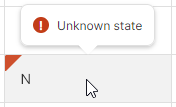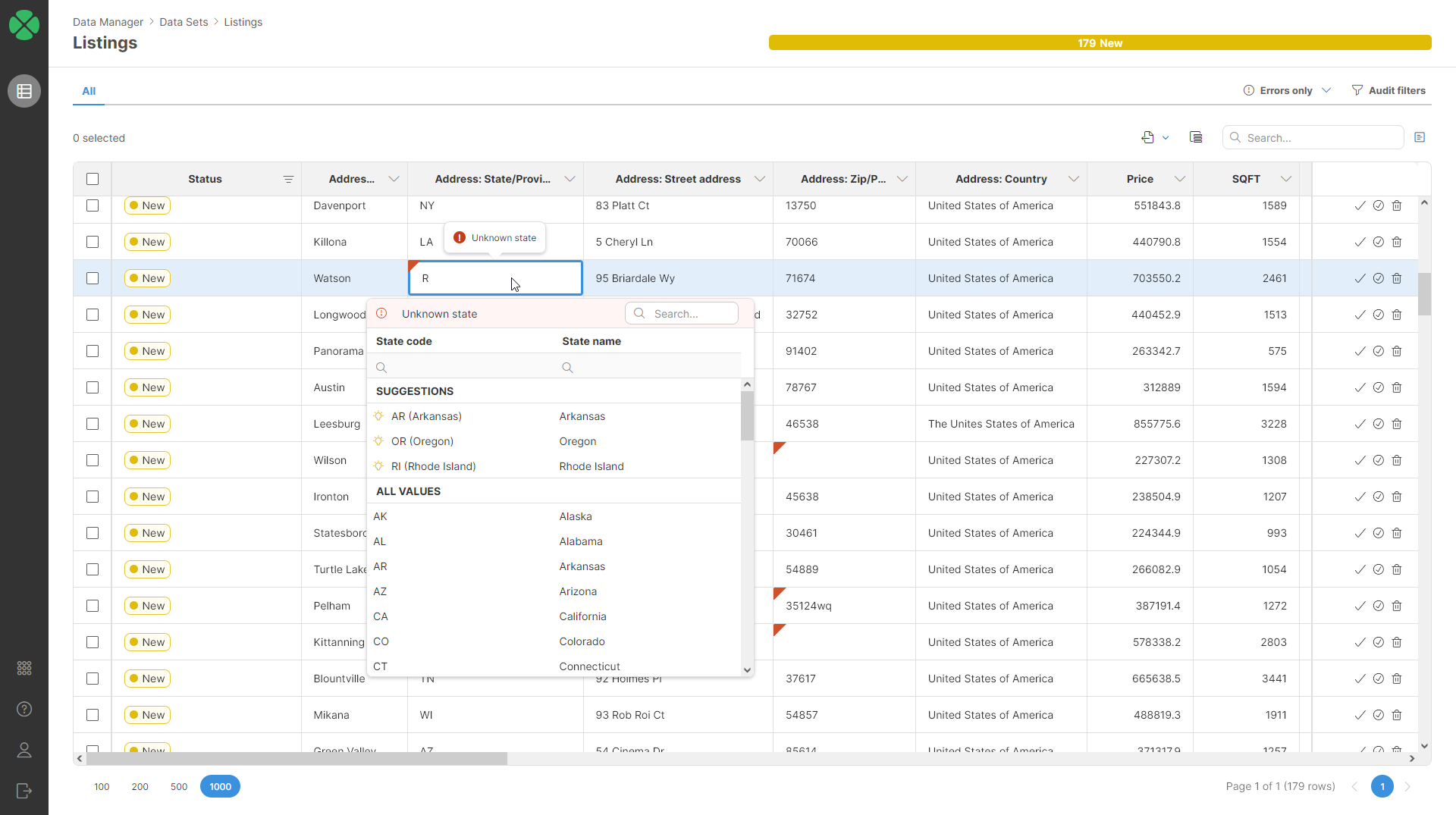
DataSetWriter

Short description
DataSetWriter writes data to data set managed by the Data Manager.
|
This component must run on CloverDX Server. It only connects to the Data Manager instance deployed in the same CloverDX Server instance where it is running. |
| Data output | Input ports | Output ports | Transformation | Transf. req. | Java | CTL | Auto-propagated metadata |
|---|---|---|---|---|---|---|---|
Any data set in Data Manager |
1 |
1 |
✓ |
⨯ |
⨯ |
✓ |
✓ |
Ports
| Port type | Number | Required | Description | Metadata |
|---|---|---|---|---|
Input |
0 |
✓ |
For the data to write to the data set. |
Auto-propagated based on the layout of the selected data set with one extra field called |
Output |
0 |
⨯ |
For records successfully written to the data set. |
Auto-propagated based on the layout of the selected data set – contains all data set fields with additional field called |
Metadata
The DataSetWriter component propagates metadata on the input port. The input metadata is created based on the layout of the selected data set. If different metadata is used, you can configure the Input mapping to map the incoming records to records required by the data set.
DataSetWriter attributes
| Attribute | Req | Description | Possible values |
|---|---|---|---|
Basic |
|||
Data Set |
✓ |
Data set to write to. Clicking on the select button will show all data sets available on the Server. |
|
Input mapping |
Allows you to map incoming records to records in the data set. Default mapping (when nothing is configured) is to map by name. |
||
Output mapping |
Allows you to map data written to the data set to the output port. By default, this is set to Map by name and fields with matching names and types will be mapped automatically. This is consistent with the common usage where the metadata on output port 0 is auto-propagated and will match the data set exactly. |
||
Details
DataSetWriter connects to an instance of Data Manager running on the same Server as the component and writes (inserts) new records into the selected data set. The component does not perform any validation of the data - the validation must be implemented before and the validation results sent to the component via _messages field (see below for more details).
Submitting information about errors to the data set
When writing to the data set, you can add information about validation errors to the data. It will be shown in the Data Manager editor with an error marker in the column and error message as a tooltip:

To add this kind of information to the data, you must submit it via _messages field. The _messages field is of type variant and has the following structure:
{
"fieldName1" : {
"messageText" : "Any message"
},
...
"fieldNameN" : {
"messageText" : "Another message"
}
}In the above structure, each field can have one message attached to it. You can supply any number of fields in the single variant value.
For example, to submit an error message about the state field like on the above screenshot, you can do this:
$out.0._messages = {
"state" -> {
"messageText" -> "Unknown state"
}
};This can be done either before the data is submitted to the DataSetWriter in a variant field and then mapped into the _messages field or this information can be derived directly in the Input mapping in the DataSetWriter component.
The message itself can be any text – just remember that the text is shown in a tooltip and tooltips that are too long are usually hard to read.
The field name is case sensitive and must match the name of the field in the metadata for the given data set.
The approach will depend on what kind of validation messages you’d like to submit. In many cases you will use additional components to validate your data (e.g., Validator, Map, etc.) and thus it may make sense to create the messages variant before DataSetWriter.
Simple validations can be done directly in the DataSetWriter.
To submit multiple messages simply include multiple fields in the variant. The order in which the fields are listed in the variant does not matter.
$out.0._messages = {
"state" -> {
"messageText" -> "Unknown state"
},
"price" -> {
"messageText" -> "Price cannot be negative"
}
};Submitting error information with suggestions
To help users when editing data in Data Manager, it is possible to submit suggestions together with the messages. Suggestions are only available for columns that are defined as Restricted to lookup – i.e., their values can only come from a lookup. See additional information about lookups and their configuration in Data layout documentation.
The suggestions are displayed when the user clicks into the cell when editing the value. Suggestions are shown as a dropdown or table depending on how the lookup is configured (dropdown is used for lookups with just two columns, table for lookups with more than two columns):

The suggestions can be provided for each field and are stored as a list of items where each item has a value and a label. The value must correspond to the key field value in a lookup used for the given column while the label is any text you wish to associate with the given value. Note that the label does not have to match the label in the lookup - you can use it to provide additional information (e.g., confidence score or anything else that will help users pick the correct value).
The _messages variant with the suggestions for a field must have the following structure:
{
"fieldName" : {
"messageText" : "Any message",
"suggestions" : [
{
"label" : "Suggestion 1 label",
"value" : <id 1>
},
...
{
"label" : "Suggestion N label",
"value" : <id N>
}
]
}
}The type of the value attribute must match the type of the lookup key column – it can be string, integer, date.
It is possible to submit any number of suggestions, but we recommend submitting 3 as a maximum to not overwhelm the user.
As an example, if you want to submit suggestions for the state in the example above, it may look like this:
$out.0._messages = {
"state" -> {
"messageText" -> "Unknown state",
"suggestions" -> [
{
"label" -> "CA (California)",
"value" -> "CA"
},
{
"label" -> "CO (Colorado)",
"value" -> "CO"
},
{
"label" -> "CT (Connecticut)",
"value" -> "CT"
}
]
}
};Compatibility
| Version | Compatibility Notice |
|---|---|
6.5 |
DataSetWriter introduced as Incubation component in 6.5.0. |
6.6 |
DataSetWriter with expanded functionality, still an Incubation component in 6.5.0. |
